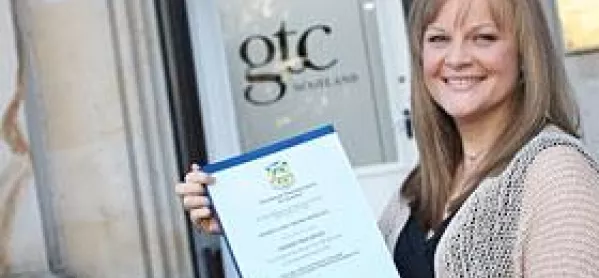Student teacher shines a light on maths phobia

Research by a maths-phobic student teacher could have important implications for new entrants to the profession who will have to demonstrate their literacy and numeracy proficiency under teacher education reforms.
Sharon Friel-Myles, who did her BEd at the University of Dundee, has won the General Teaching Council for Scotland’s George D Gray Award for the best undergraduate thesis in teacher education in Scotland, which looked at maths anxiety among teachers and the potential effects on pupils.
Her dissertation, focusing on three teachers in different primary schools, found that maths-anxious teachers could often trace their anxiety back to their own experiences at school - and transmit it to their pupils.
In “How can a maths-anxious teacher promote positive attitudes towards mathematics?”, Mrs Friel-Myles argues that there is a specific anxiety that undermines confidence in maths and can contribute to reduced mathematical performance. But she found that maths anxiety is still little recognised in Scottish schools, despite robust international research on its impact, and that children and teachers would benefit from greater support and understanding of the condition.
Her supervisor, Sheila Henderson, piloted an online maths assessment for student teachers at Dundee and is now on a national group developing a similar assessment as part of the implementation of Teaching Scotland’s Future, the report on teacher education by Graham Donaldson.
Dr Henderson said Mrs Friel-Myles was a shining example of why entry levels for teacher education should not be raised and a pre-entry test should not be set for student teachers.
“Sharon entered the course with an Intermediate 2 in maths - the current entry level requirement. There have been rumblings that that should be put up to a Higher in maths. If that had happened, we would never have got a student like Sharon on the course,” she said.
She also believes that the introduction of a pre-entry maths test would have deterred Mrs Friel-Myles and others like her who have, through support on their teacher education course, overcome their maths anxiety.
Mrs Friel-Myles initially worked in nursery education because it only involved using numbers up to 20. But she was so keen to become a primary teacher that she took an Access to Teaching course and overcame her fear of maths sufficiently to gain an A in Intermediate 2. Once on the BEd course, she worked hard on her maths anxiety and chose to research it for her final thesis.
Her main findings are:
- Maths anxiety can manifest itself as physical and psychological symptoms;
- Teachers employ numerous strategies to cope with maths anxiety in the classroom, including lesson preparation, confidence-building tactics and techniques for staying calm. These can eventually help to overcome the anxiety;
- Having a maths-anxious teacher may have an impact on children’s attitudes towards maths, although their negative attitudes could link to other factors such as self-esteem or individual differences.
She concludes: “The Scottish government states that teachers must begin to shift away from commercially produced schemes. My study shows that teachers still feel that they need the support of these to ensure they are teaching the right mathematical concepts.
“In light of this, it would seem that local authorities must provide more training opportunities for teachers to have a sound understanding of mathematical concepts and an awareness of the effects of maths anxiety.”
elizabeth.buie@tess.co.uk
BREEDING ANXIETY
International research suggests maths anxiety can stem from a gap in knowledge, for example if the child had not been developmentally ready to receive a new piece of learning (Martinez and Martinez, 1996).
Environmental factors can include a child being taught by insensitive teachers who create a stressful learning environment and pressure or negative attitudes from teachers and family (Tobias, 1993).
A teacher who lacks confidence in maths may pass that on to pupils, it is argued, because the children are less likely to develop positive attitudes towards the subject.
Photo of Sharon Friel-Myles. Photo credit: GTCS
Keep reading for just £1 per month
You've reached your limit of free articles this month. Subscribe for £1 per month for three months and get:
- Unlimited access to all Tes magazine content
- Exclusive subscriber-only stories
- Award-winning email newsletters